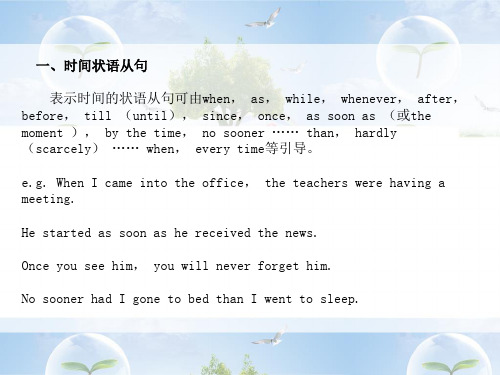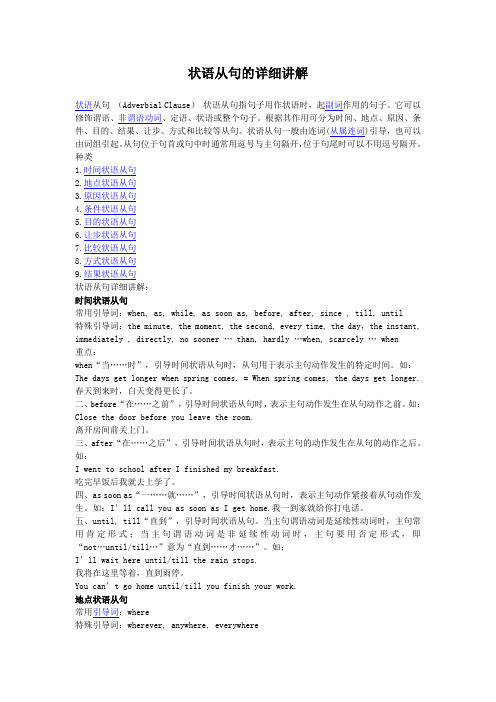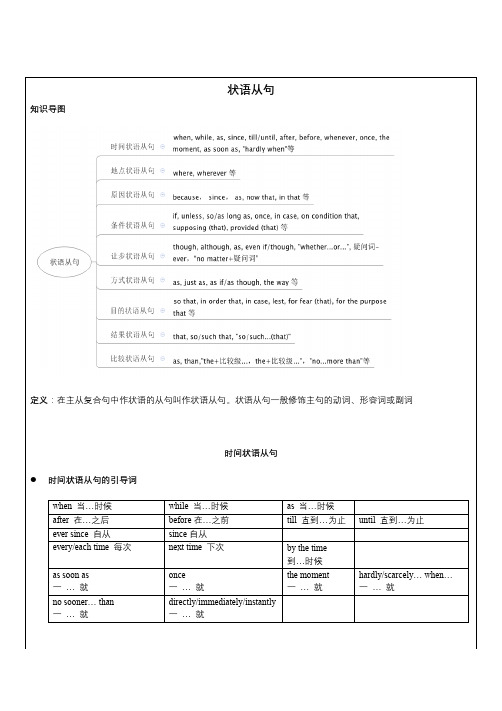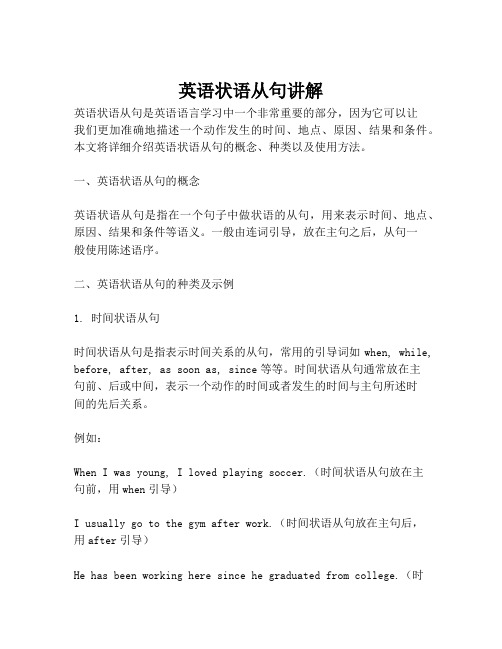状语从句完整讲解
英语语法讲解状语从句

Whatever ( = No matter what ) you say, I'll never change my mind.
八、方式状语从句
方式状语从句常由as, as if (though), the way, rather than 等引导。
You can go swimming on condition that ( = if ) you don't go too far away from the river bank.
If he had come a few minutes earlier, he could have seen her.
e.g. He is disappointed because he didn't get the position.
As it is raining, I will not go out.
Now that you mention it, I do remember.
三、地点状语从句
引导地点状语从句的连词是where 和wherever等。 e.g. Sit wherever you like. Make a mark where you have a question.
一、时间状语从句
表示时间的状语从句可由when, as, while, whenever, after, before, till (until), since, once, as soon as (或the moment ), by the time, no sooner …… than, hardly (scarcely) …… when, every time等引导。
(完整版)状语从句的讲解最全的状语从句讲解

状语从句的讲解就是用一句话作状语分为:时间,地点,方式,原因,结果,条件,让步,目的,比较一、时间状语从句第一次见到你一见到你我就喜欢上了你直到见到你五岁时见到你When, as, while, before, after, since, till/until, as soon as no sooner…than…scarcely…when…hardly…when… the minute the second the instant the moment by the time 截止 immediately instantly directlyeach time every time next time the first time on doing sthwhenwhile 当…时as1。
when 1)当…时/ 延续性动词短暂性动词都可用2)这时/3)届时、到时I was watching TV when my cellphone suddenly rang这时When I was five years old I could speak five languagesThe wet weather will continue tommorow when a cold front is expected to arrive届时到时注意:时间状语从句中动作发生有前后时先发生的用过去完成时When my mother came back I had already gone to bed.2。
while 1)从句动词延续性2)同时发生3)对比的意味“然而”4)趁着He taught himself while he worked in a bank 延续性动词当他在银行上班时While we were working they were having a rest.对比While they were having a discussion , they got very confused。
状语从句知识点详解(初中英语专项复习)14

状语从句知识点详解(初中英语专项复习)状语从句的概念: 用一个句子作状语来修饰动词和形容词,以表明动作发生或状态存在的时间、地点、原因等,这个句子就叫做状语从句。
状语从句的分类:状语从句共分为九大类,包括:时间、地点、原因、条件、让步、目的、结果、方式、比较状语从句。
下面分别讲解:一、时间状语从句概念:用来表示时间的状语从句,由when, while, as, till, until,before, after, since等引导。
由于时间状语从句的引导词所表示的意思并非一致,不同引导词表达不同的时间,它们在句子中对应的时态、语态等也有所不同。
例如:when /while引导的时间状语从句when引导的从句的谓语动词通常是瞬间动词,也可以是延续性动词。
从句动作可与主语动作通常先后发生也可同时发生。
I was writing when my sister came back.( come是瞬间动词,只能用when引导,不能用while)He often wrote me when/while he studied in Shanghai International Studies University.( study 是延续性动词,while可代替when)While my mother was cooking , I was playing chess with dad. (cook是延续性的动词,cook和play同时发生)I like playing chess while my sister likes reading stories.我喜欢下棋,而我姐姐喜欢看小说。
(while表示对比)when和while的区别还有:while引导的时间状语从句多用于进行时态,而when引导的时间状语从句多用于一般时态。
While we were playing games, our headmaster called me .我们正在做游戏的时候,校长叫我了。
状语从句的详细讲解

状语从句的详细讲解状语从句(Adverbial Clause)状语从句指句子用作状语时,起副词作用的句子。
它可以修饰谓语、非谓语动词、定语、状语或整个句子。
根据其作用可分为时间、地点、原因、条件、目的、结果、让步、方式和比较等从句。
状语从句一般由连词(从属连词)引导,也可以由词组引起。
从句位于句首或句中时通常用逗号与主句隔开,位于句尾时可以不用逗号隔开。
种类1.时间状语从句2.地点状语从句3.原因状语从句4.条件状语从句5.目的状语从句6.让步状语从句7.比较状语从句8.方式状语从句9.结果状语从句状语从句详细讲解:时间状语从句常用引导词:when, as, while, as soon as, before, after, since , till, until特殊引导词:the minute, the moment, the second, every time, the day,the instant, immediately , directly, no sooner … than, hardly …when, scarcely … when重点:when“当……时”,引导时间状语从句时,从句用于表示主句动作发生的特定时间。
如:The days get longer when spring comes. = When spring comes, the days get longer. 春天到来时,白天变得更长了。
二、before“在……之前”,引导时间状语从句时,表示主句动作发生在从句动作之前。
如:Close the door before you leave the room.离开房间前关上门。
三、after“在……之后”,引导时间状语从句时,表示主句的动作发生在从句的动作之后。
如:I went to school after I finished my breakfast.吃完早饭后我就去上学了。
高中英语--状语从句专题讲解(详细)

注:
“no sooner…than…”,“hardly…when…”引导时间状语从句时,主句用过去完成时,从句用一般过去时。此外,当把no sooner, hardly/scarcely提到句首时,主句用部分倒装。
as意为“随着,一边…,一边…”,常有以下用法:
a)用于表示两个动作同时或者几乎同时发生。
b)表示两个发展变化中的情况。
c)表示在某事发生的过程中另外一件事发生。
d)表示随着短暂动作的发生,另一动作立刻发生。
before和after引导的时间状语从句
before意为“在…之前”,表示主句动作发生在从句动作之前。
=I hardly told him the news when he stopped listening.
地点状语从句
地点状语从句的引导词有when和wherever。
where, wherever指具体地点时,从句可用于主句之前或之后;
where, wherever表示抽象概念的含义时,从句需放在主句前。
When hehad finishedhis homework, hetooka short rest.(先发生+后发生)
When Igotto the airport, the guesthad left.(后发生+先发生)
注:
when还可表示原因,意为“既然”,引导原因状语从句;也可以用作并列连词,意为“就在那时”,常构成如下结构:
A number of high buildings have arisen where there was nothing a year ago but ruins.(where表示具体地点)
英语状语从句讲解

英语状语从句讲解英语状语从句是英语语言学习中一个非常重要的部分,因为它可以让我们更加准确地描述一个动作发生的时间、地点、原因、结果和条件。
本文将详细介绍英语状语从句的概念、种类以及使用方法。
一、英语状语从句的概念英语状语从句是指在一个句子中做状语的从句,用来表示时间、地点、原因、结果和条件等语义。
一般由连词引导,放在主句之后,从句一般使用陈述语序。
二、英语状语从句的种类及示例1. 时间状语从句时间状语从句是指表示时间关系的从句,常用的引导词如when, while, before, after, as soon as, since等等。
时间状语从句通常放在主句前、后或中间,表示一个动作的时间或者发生的时间与主句所述时间的先后关系。
例如:When I was young, I loved playing soccer.(时间状语从句放在主句前,用when引导)I usually go to the gym after work.(时间状语从句放在主句后,用after引导)He has been working here since he graduated from college.(时间状语从句放在主句后,用since引导)2. 地点状语从句地点状语从句表示一个动作所发生的地点,通常由where、wherever 引导。
例如:Wherever you go, I will follow you. (地点状语从句中,wherever 引导)I will go wherever the wind takes me.(地点状语从句中,where 引导)3. 原因状语从句原因状语从句表示主句的动作发生的原因,通常由because、since、as等引导。
例如:Since it was raining outside, I chose to stay at home.(原因状语从句中,since 引导)Because she was sick, she couldn't go to the party.(原因状语从句中,because 引导)4. 结果状语从句结果状语从句用于表示主句所述的情况或动作的结果,通常由so、such...that等引导。
状语及状语从句(语法加练习完整讲解).ppt

4.动词不定式(或不定式短语): He went to see a film .他看电影去了。 My father was surprised to hear the news . 我父亲听到这个消息,感到惊奇。
5.分词(短语): He sat there reading a novel . 他坐在那儿看小说。 The students went away laughing. 学生们笑着走开了。
2023最新整理收集 do something
The Adverbial 状语
ห้องสมุดไป่ตู้ 一、什么是状语
修饰动词、形容词 、副词或整个句子 ,说明 动作或 状态特征的句子成分,叫做 状语。
1. 状语修饰动词 Silently she went away. 她悄悄地走开了。
2. 状语修饰句子 Sadly, he will not be there. 令人伤心的是,他将不会在那里了。
The Adverbial Clauses 状语从句
从状种九
时间状语从句 地点状语从句 原因状语从句 条件状语从句 让步状语从句 结果状语从句 目的状语从句 方式状语从句 比较状语从句
时间状语从句
I will discuss this with you when we meet. 我们见面时再与你讨论这件事。
(2)如果动词前有一个或几个助动词,状语位于第一个 助动词之后。 He has already had his lunch .他已吃过午饭了。
(3)如果动词是 be,状语就放在 be动词之后。 He is always at home. 他总是在家。
3.状语位于句末,这是状语的通常位置。 We get up at six in the morning . 我们早晨六点起床。
状语从句讲解经典

意思为既然或考虑到 (原因状语从句) It was foolish of you to take a taxi when you could easily walk there. How can they learn anything when they spend all their spare time watching television? Why do you want a new job when you have got such a good one? There is no point (in) owning a car when we have so good a public transport system. Why use metal when you can use plastic? How can he get the promotion when his boss dislikes him?
I will tell her about it when I see her. I was about to fall asleep when my sister came in. I will go home when he comes back.
I recognized the thief when/ as I passed him. When he finished his lecture, people stood up and applauded. I was walking on the street when I came across an old friend. We were about to set off when it began to rain. He had just finished the work when the doorbell rang. We were on the point of driving away when the policeman signed us to stop.
- 1、下载文档前请自行甄别文档内容的完整性,平台不提供额外的编辑、内容补充、找答案等附加服务。
- 2、"仅部分预览"的文档,不可在线预览部分如存在完整性等问题,可反馈申请退款(可完整预览的文档不适用该条件!)。
- 3、如文档侵犯您的权益,请联系客服反馈,我们会尽快为您处理(人工客服工作时间:9:00-18:30)。
状语从句考点知识讲解---状语从句1、时间状语从句,连词:(1)翻译下面句子:1)Don’t hand in your papers before you are sure there are no mistakes. 2)After you finish this form,come to my office.3)They talked as they walked down the river.4)As soon as you feel sick,go to see a doctor.5)I have lived in England since I was three.(2)要点:while、when、as区分WhenWhileAs(3)例如:1)When I got to the airport,the plane had taken off.2)It began to rain while we were walking in the park.3)While we were dancing, a stranger came in.4)As he grew older,he lost interest in everything except gardening. (4)时间状语从句的固定句式:---It won’t be long before(不久就)---It takes long before ....(要花多久....才)---It didn’t take long before....(不久就)---It will be long before...(要花多久...才)★以上这四句话同学们可自己体会,此句型主要考在改错、语法填空中。
---Sb was doing sth when...=Sb was about to do when...(某人正要做...另一件事发生)---It is/has been +一段时间+since(did)...(自从某人做...已经有多久了)★这两句型也多考在改错和语法填空中,可多留意或自己再多造几个句子理解。
2、地点状语从句,连词:翻译下面句子:1)We live where the road crosses the river.2)You shouldn’t go where you are not asked to.3)We should go where the Party needs us most.4)The little girl who got lost decided to remain where she was and wait for her mother.3、原因状语从句,连词:(1)翻译下面句子:1)Since you know all about it,please tell us.2)As all the seats were taken,I had to stand.3)We’ll have to go to bed early because we’ll start off ea rly tomorrow.(2)区分since、as、because、forBecauseSinceAsFor4、目的状语从句,连词:翻译下面句子:1)He looked down so that she could not see his eyes.2)You must speak louder in order that you can be heard by all.3)Please tell me the truth,so that I can decide how to help you.5、结果状语从句,连词:翻译下面句子:1)Pop music is such an important part of society that it has even influenced our language.2)His plan was such a good one that we all agreed to accept it.3)His plan was such a good one that we all agreed to accept.4)So unforgettable was the movie titled ‘The Edge of Tomorrow’ that Tim watched it over and over again.(so置于句首,要倒装)6、让步状语从句,连词:翻译下面句子:1)He said he would help me; he didn’t, though.2)We’ll go there even if the weather is bad.3)While I like him, I still see his shortcomings.4)Even though the weather was freezing, the PLA soldiers managed to reach the destination in time.5)No matter how well-prepared you are, you still need a lot of luck in mountain climbing.6)Whether global warming is natural or not, saving energy is necessary for the future.7、条件状语从句,连词:翻译下面句子:1)Small boats can easily turn over in the water if they are not managed carefully.2)You will succeed in the end unless you give up half way.3)You are not required to speak unless asked to.4)The medicine will not have any negative effects as long as taken according to the directions.8、方式状语从句,连词:翻译下面句子:1)You should do as I do.2)He left as if he was disappointed.3)He walked about as though he had lost something.基础训练难度★(此部分较简单,可由学生单独作答后修改)1、根据中文意思完成下列英语句子1)不管他跟我开什么玩笑,我都不生气。
I am not angry with him, _______ _______ ______ jokes he ______ on me.2)布鲁斯太太对学生非常亲切,以至于学生把她当作母亲。
Mrs. Bruce was _______ kind to her students ______ they ______ her _____ their mother. 3)只要我们竭尽全力,父母就会满意我们的表现。
Our parents will be pleased with our performance _____ _____ ______ we try our best.4)你一到上海就给我打个电话好吗?Will you please call me ______ ______ ______ you get to Shanghai.5)这个七岁的女孩酷爱钢琴,以至于他已经坚持练习两年了。
The seven-year-old girl likes playing the piano ______ ______ she has kept practicing for two years.2、根据句意,用适当的连词完成句子1)Tom thinks action movies are interesting,I think they are boring.2)I have been collecting stamps I was nine years old.3)It isn’t warm today, the sun is shining.4)Yesterday Tom didn’t go to see the film he had to revise his lessons.5)It’s so hot I can’t go to sleep.提升训练难度★★★1、阅读短文,在空白处用适当的连词填空。
We each have a memory. That’s why w e can remember things for a long time. Some people have a very good memory they can easily learn many things by heart, some people can only remember things when they say do them again and again.A good memory helps one learn a language well. Everybody learns his own languageHe is a small child. He hears the sounds, remembers them and then he learns to speak. Some children are living with their parents in foreign countries. They can learn two languages easily They hear, remember and speak the two languages every day. At school it is not easy to learn a foreign language the students have little time for it and they have to learn other subjects, too.Our memory can get better and better we do more and more exercises. Do you want to learn a foreign language well? If so, you must do a lot of listening speaking.2、单句填空1)He smiled politely Mary apologized for her drunken friends.2)It was April29,2011 Prince William and Kate Middleton walked into the palace hall of the wedding ceremony.3)One Friday,we were packing to leave for a weekend away my daughter heard cries for help.4)Mary made coffee her guests were finishing their meal.5)John thinks it won’t be long he is ready for his new job.6)Just use this room for the time being,and we’ll offer you a larger one it becomes available.7)It just isn’t fair I was working as a waiter last month,my friends were lying on the beach.8)I always felt I would pass the exam,I never thought I would get an A.9)all of them are strong candidates,only one will be chosen for the post.10)One’s life has value one brings value to the life of others.11)Leave your key with your neighbor you lock yourself out one day.12)He had his camera ready he saw something that would make a good picture. 13)My parents don’t mind what job I do I am happy.14) Animals suffered at the hands of Man they were destroyed by people to make way for agricultural land to provide food for more people.15) Helen could easily find the way to the hotel ________ she was familiar with the area.3、语法填空A modern bicycle by definition (定义) is a rider-powered vehicle with two wheels,1 (power) by the rider turning pedals (踏板) that are connected to the rear (后部的) wheel by a chain} and a seat for the rider. Bicycles are2 great benefit to people around the world. With that definition in mind, let's look at the history of early bicycles, a time3 we can learn something about bicycles' development.A few years ago,most historians thought that pierre and Ernest Michaux, the French father-and-son team of carriage-makers, 4 (invent) the first bicycle in the 1860s. Historians now diszlgree 5 there is evidence that the bicycle and bicycle-like vehicles are 6 (old) than that. Historians do agree that Ernest Michaux invented a bicycle with pedals in 1861 7 ( actual). However, they disagree if Michaux made 8 very first bike with pedals.In bicycle history, Leonardo da Vinci drew a design for a very modern looking bicycle in 1490. This has been proven to be untrue.In 1790 a Frenchman, Comte Mede de Sivrac invented a bicycle. However, it had four wheels instead of two and a seat. A cychst would power forward by 9 (use) their feet for a walking/running pushoff. But this invention 10 ( bring) gfeat convenience to people.。
